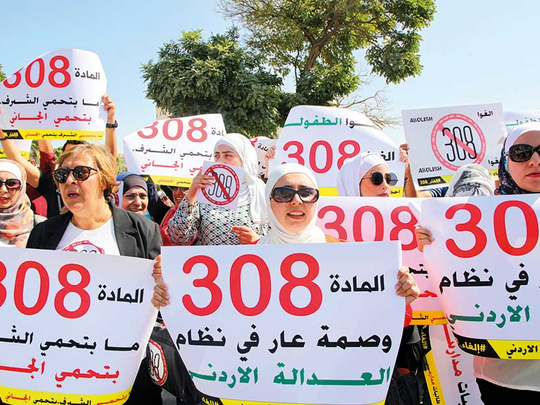
Amman: The lower house of Jordan’s parliament on Tuesday scrapped a provision in the kingdom’s penal code that allowed a rapist to escape punishment if he married his victim.
Cheers erupted from the spectators’ gallery as legislators narrowly voted for repeal, following an emotional debate. It was seen as a major victory for women’s rights in the kingdom after years of campaigning by activists.
Despite a pro-Western political orientation outlook and cosmopolitan urban elites, many areas of Jordan remain socially conservative, with entrenched notions of “family honour.”
This includes the belief that having a rape victim in the family is shameful, and that such “shame” can be expunged through marriage.
In Tuesday’s debate, some lawmakers had argued that an amended version of Article 308 was needed to protect rape victims against social stigma by giving them the marriage option.
In the end, lawmakers voted in line with the recommendations of the government and a royal committee on legal reforms.
The decision must still be approved by parliament’s appointed upper house, or Senate, and by King Abdullah. After the expected final approval, Jordan would join Tunisia, Morocco and Egypt which have cancelled their “marry the rapist” clauses over the years.
The international rights group Human Rights Watch said Lebanon’s parliament is also considering repealing such a provision. The clause remains on the books in several other countries in the Middle East and Latin America, as well as in the Philippines and Tajikistan, HRW said.
In a statement issued before Tuesday’s vote, the New York-based watchdog said that scrapping Article 308 “would be a positive step to strengthen the rule of law and end impunity for violence against women.”
Ahead of Tuesday’s vote, several dozen activists rallied outside the parliament in Amman, the Jordanian capital, calling for repeal. They held up banners reading “Article 308 is a disgrace to the Jordanian justice system” and “Article 308 does not protect honour, it protects the culprit.”
Salma Nims, the secretary general of the Jordanian National Commission for Women, said before the vote that many of the lawmakers had been undecided.
She said some saw the provision as a form of “protection” for women who can demand marriage rather than suffer further social stigma for having been raped.
The need for such “protection” indicates a fundamental problem in how Jordanian law and society perceive women, said Eva Abu Halaweh, executive manager of Mizan for Law, a human rights group.
“The law still looks at women as bodies, linked with ‘honour,’” Abu Halaweh said.












